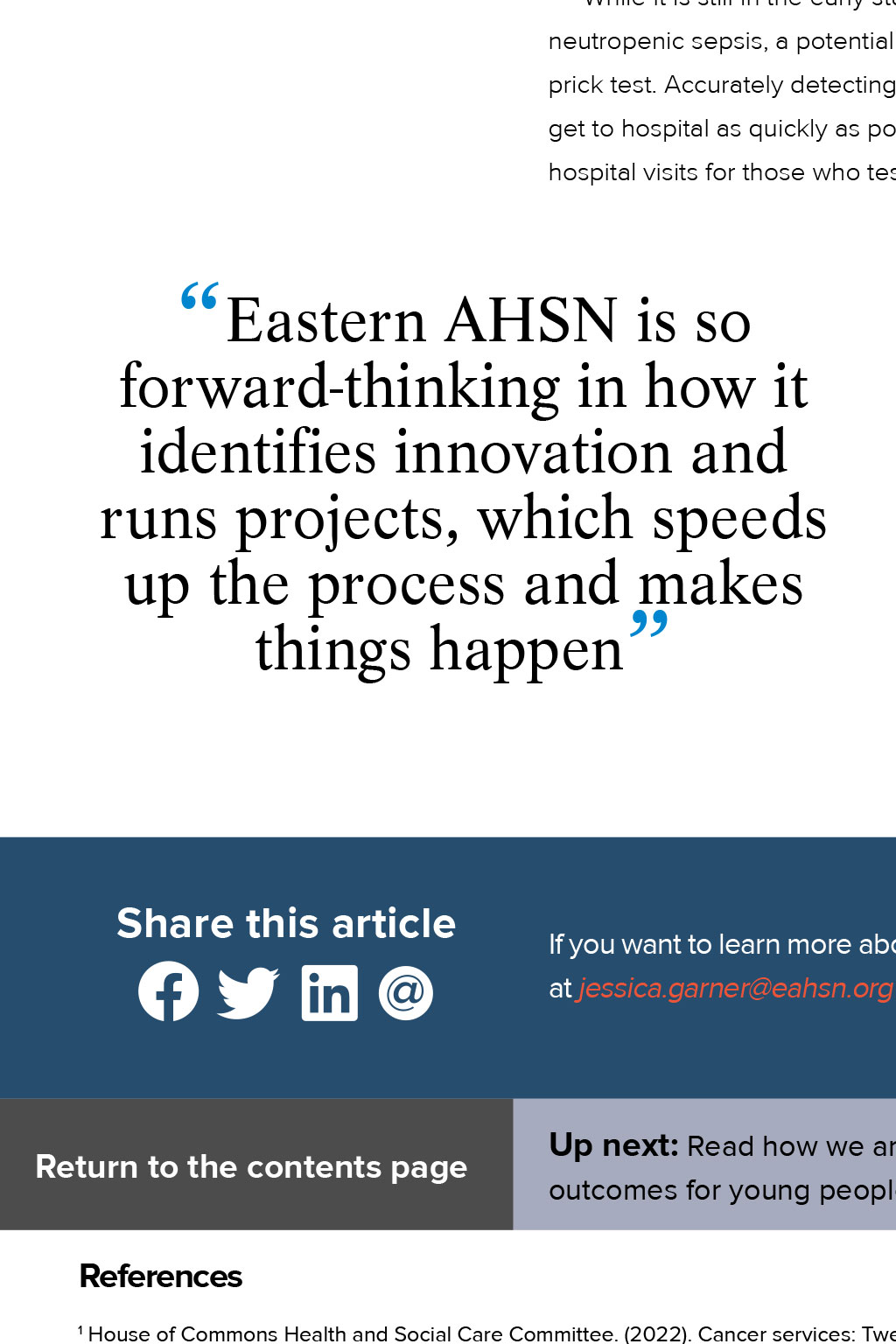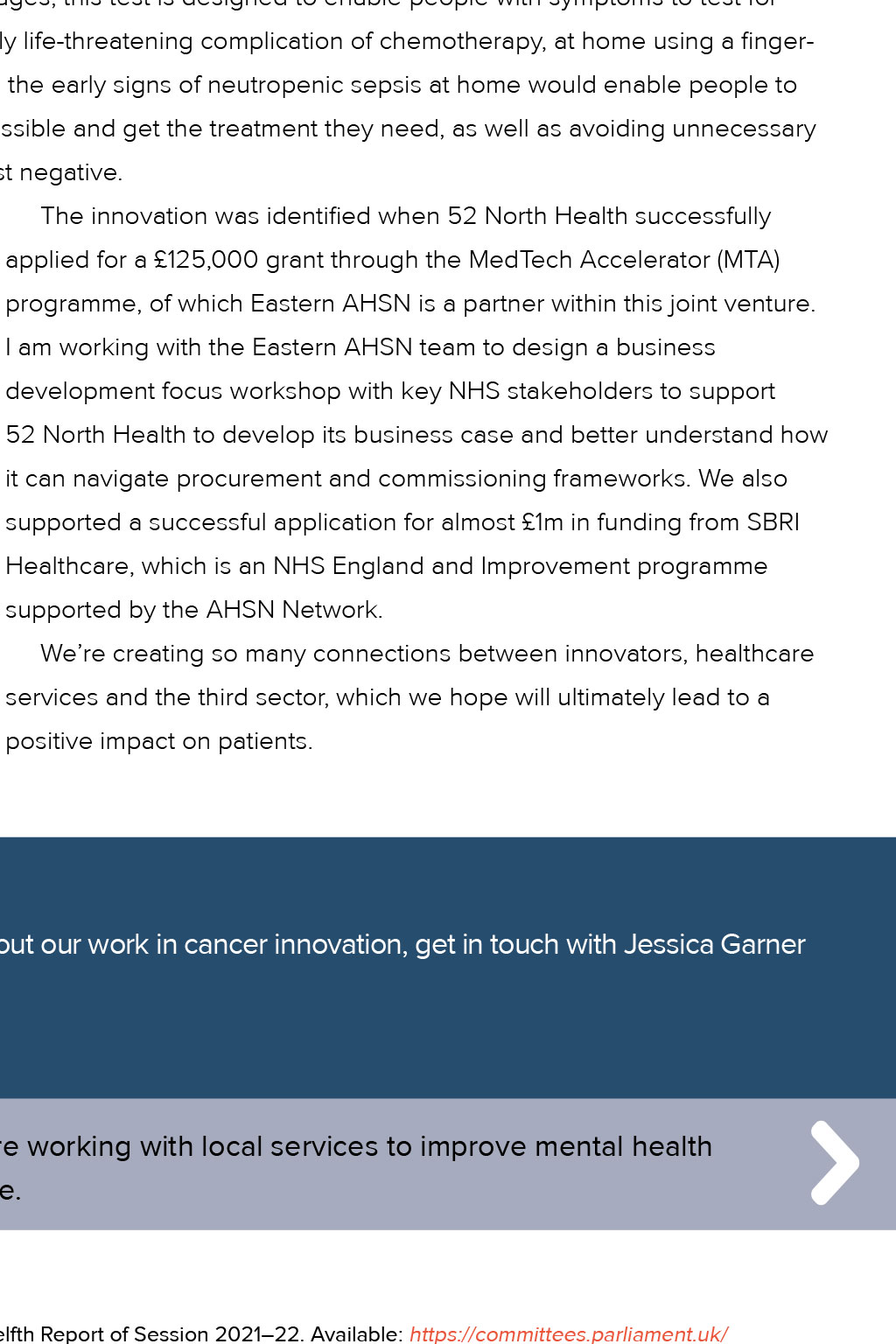




























Focus on: cancer The sooner, the better Dr Jag Ahluwalia, Chief Clinical Officer at Eastern AHSN, explores where innovation is helping to identify cancer earlier W hile the NHS took steps to protect services and continue to encourage people to engage with clinicians if they were unwell, 36,000 fewer people in England began The single most effective way to improve overall survival rates is to diagnose more cancers earlier cancer treatment during the pandemic (April 2020 March 2021) compared with previous years. In April, a report from the House of Commons Health and Social Care Committee (HSCC) described providers having to ration treatment, likening working in cancer services during the pandemic to working 25 years ago1. The combined impact of patients reluctance to come forward, late diagnosis and delayed treatment will almost certainly mean that many lives will end prematurely. The HSCC report also demonstrated that the NHS is not on track to meet its target on early cancer diagnosis namely, the NHS Long Term Plans target to diagnose 75% of cancers at stage I or II by 20281. Therefore, urgent steps are needed now to prevent the UK from losing gains made in recent years on cancer survival rates and to halt a predicted rise in avoidable cancer deaths because of this delayed diagnosis and treatment2. Thats why cancer remains a key focus of our strategy at Eastern AHSN. We believe we have a key role in helping enable providers of cancer services to access proven innovations in diagnosis and treatment to manage capacity, increase efficiency and improve care and outcomes Improving earlier diagnosis on cancer The single most effective way to improve overall survival rates is to diagnose more cancers earlier. We have supported pilots of three innovations in the region that have helped improve earlier detection and treatment of cancers when there may be an increased range of treatment options, improved long-term survival and quality of life. Earlier diagnosis of cancer also helps address the pressures on resources in secondary care and services with extensive waiting lists following the COVID-19 pandemic. Skin analytics Skin Analytics uses AI and remote reviewing by local dermatologists to support clinicians in their assessment of skin lesions, directing patients to the best assessment or treatment options. Eastern AHSN partnered with Norwich Primary Care Network (PCN) and Norfolk and Waveney Clinical Commissioning Group (CCG) to fund the evaluation of a pilot of Skin Analytics remote dermatology consultant service to support rapid assessment of dermatological lesions across 14 GP surgeries between April 2019 and March 2020. The remote consultant service accurately identified more than 400 lesions (more than half of all those reviewed) that could be managed within primary care, with only 0.45% of these lesions re-presenting to a GP within six months of the initial referral to the remote consultant. This suggests the potential to relieve pressure on secondary cancer services using teledermatology. The pilot also suggested that Skin Analytics could save 11,929 per year across the 14 practices and 89,876 per year if the service was commissioned throughout Norfolk and Waveney CCG. You can read more about our work across Norfolk and Waveney with Skin Analytics here. More recently, Suffolk and North East Essex Integrated Care System has implemented Skin Analytics AI solution as part of the two-week wait skin cancer pathway, with funding secured from NHS England and NHS Improvement. The pathway was launched at West Suffolk Hospital NHS Foundation Trust in October 2021 and is already streamlining each patients journey through the pathway and supporting rapid access to treatment where required. Early CDT Lung Test The EarlyCDT Lung test from Oncimmune is a blood test to support the early detection of lung cancer. Almost 9 in 10 lung cancer patients will survive their disease for at least a year if diagnosed at the earliest stage3. Eastern AHSN brokered and part-funded a pilot with Norfolk and Waveney CCG using the EarlyCDT Lung test to screen patients at high risk of developing lung cancer across five GP practices in Great Yarmouth. The pilot enabled the screening of 1,749 smokers and ex-smokers and identified 300 to be referred for a CT scan in secondary care. We are now working with the University of Southampton to further evaluate the test by using the data from the pilot to model the clinical impact of the intervention under non-pandemic conditions. This is due for completion in June 2022. Cytosponge Cyteds Cytosponge is a nonendoscopic test that detects oesophageal cancer and Barretts Oesophagus a pre-cancerous condition that may mean an individual is at higher risk of oesophageal cancer. In a nurse-led clinic, a patient swallows a small pill on a string that contains a sponge. When the pill reaches the stomach, the capsule dissolves and the sponge expands. The sponge collects cells from the lining of the oesophagus as it is withdrawn and the cells are sent for analysis, where pathologists will use a simple antibody test to spot the signs of a patient being at risk of having cancer. Through Project DELTA, the University of Cambridge and Heartburn Cancer UK are bringing Cytosponge to eligible patients identified across Cambridgeshire, Essex and Suffolk through a mobile diagnostic unit in the community. Eastern AHSN has contributed 10,000 in funding to support additional staffing capacity in the pilot, which will run until summer 2022. Prof. Rebecca Fitzgerald, Co-founder and Clinical Advisor at Cyted, holds a dissolved Cytosponge capsule Partnering with Macmillan to support cancer innovation Emma Quintal, Innovation Partnerships Manager at Macmillan Cancer Support I was first introduced to Eastern AHSN when they partnered with us at Macmillan Cancer Support to run an innovation matching event focused on oncology. We convened cancer leads from the NHS, healthcare companies and the third sector to showcase some of the exciting innovators Eastern AHSN work with, whose innovations were identified as having the potential to help cancer patients and services. It was clear that the two organisations purposes were aligned and, as a result, I was seconded to Eastern AHSN for a day a week to help keep momentum on some of the connections created and offer insight from my experience from Macmillan and 10 years working in palliative care. I can also help identify opportunities for integrating innovations into services and ensuring they have the right patient input. It is vital that we continuously improve outcomes for people with cancer and I believe that this is built on innovation and diversifying the support services we offer. Eastern AHSN is so forward-thinking in how it identifies innovation and runs projects, which speeds up the process and makes things happen. In the short time Ive been seconded, I have already seen the direct impact this delivers for services and patients. Im really proud that, as a result of our introduction, Macmillan Cancer Support has partnered with the Sepsis Trust to enter an agreement with 52 North Health, who presented their Neutrocheck test innovation at the matching event. While it is still in the early stages, this test is designed to enable people with symptoms to test for neutropenic sepsis, a potentially life-threatening complication of chemotherapy, at home using a fingerprick test. Accurately detecting the early signs of neutropenic sepsis at home would enable people to get to hospital as quickly as possible and get the treatment they need, as well as avoiding unnecessary hospital visits for those who test negative. The innovation was identified when 52 North Health successfully applied for a 125,000 grant through the MedTech Accelerator (MTA) Eastern AHSN is so forward-thinking in how it identifies innovation and runs projects, which speeds up the process and makes things happen programme, of which Eastern AHSN is a partner within this joint venture. I am working with the Eastern AHSN team to design a business development focus workshop with key NHS stakeholders to support 52 North Health to develop its business case and better understand how it can navigate procurement and commissioning frameworks. We also supported a successful application for almost 1m in funding from SBRI Healthcare, which is an NHS England and Improvement programme supported by the AHSN Network. Were creating so many connections between innovators, healthcare services and the third sector, which we hope will ultimately lead to a positive impact on patients. Share this article Return to the contents page If you want to learn more about our work in cancer innovation, get in touch with Jessica Garner at jessica.garner@eahsn.org Up next: Read how we are working with local services to improve mental health outcomes for young people. References House of Commons Health and Social Care Committee. (2022). Cancer services: Twelfth Report of Session 202122. Available: https://committees.parliament.uk/ publications/9562/documents/161967/default/. Last accessed 03/05/22. 2 House of Commons Health and Social Care Committee. (2022). Lack of serious effort on cancer workforce shortages risks reversal of survival rates. Available: https:// committees.parliament.uk/committee/81/health-and-social-care-committee/news/165301/lack-of-serious-effort-on-cancer-workforce-shortages-risks-reversal-of-survivalrates/. Last accessed 03/05/22. 3 Cancer Research UK. (2021). Why is early diagnosis important?. Available: https://www.cancerresearchuk.org/about-cancer/cancer-symptoms/why-is-early-diagnosisimportant. Last accessed 03/05/22 1